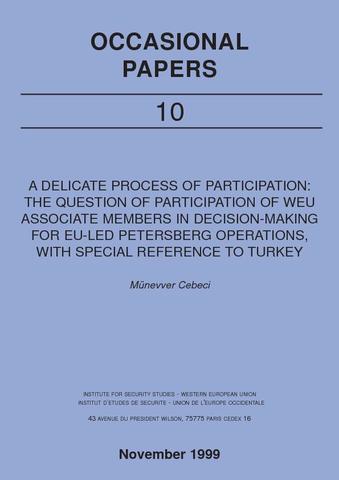You are here
A delicate process of participation: the question of participation of WEU Associate Members in decision-making for EU-led Petersberg operations, with special reference to Turkey

This paper analyses one of WEU’s several types of membership, “Associate Membership”, while addressing, in particular, the issue of participation of WEU Associate Members in the EU decision-making process for Petersberg operations. European Members of NATO which are not members of the EU (the Czech Republic, Hungary, Iceland, Norway, Poland, and Turkey) are Associate Members of WEU, with which they maintain a close relationship. This study focuses more specifically on Turkey’s participation in EU-led operations, since this country’s geographical and political position vis-à-vis the EU is unique, as will be discussed below. <br /><br />The issue of participation of WEU Associate Members in the EU decision-making process for EU-led Petersberg operations came to the fore after the signing of the Amsterdam Treaty in 1997, when the Treaty inserted the Petersberg tasks into the Common Foreign and Security Policy (CFSP) framework and stipulated that the EU would avail itself of WEU to implement those tasks. Since they were not members of the EU, the WEU Associate Members would not have a say in the decision-making for such operations, which would be conducted by WEU at the request of the EU. The issue assumed a new dimension with the discussions that were raised by the British initiative on a common European defence and by the St-Malo Declaration of December 1998, about a possible EU-WEU merger. Finally, when the Cologne European Council of 3 and 4 June 1999 provided for such a merger, the issue was extended to the inclusion of the WEU Associate Members, not only in EU-led Petersberg operations but also in the new EU/CFSP framework that was to be established. This was significant in the sense that if the EU/WEU merger took place without any special arrangements for the involvement of WEU Associate Members in this new framework, it would inevitably lead to a diminution of their status and the rights that they had acquired accordingly. Therefore, the issue became more complicated and somewhat more delicate than it had been before. <br /><br />A coherent security policy for a region, and especially for a continent, can only be established with the inclusion of all the significant security actors in the region. A holistic approach to European security, therefore, requires the participation of all European security actors in a framework such as that established by WEU. Accordingly, the argument put forward in this paper is that EU Member States should take the necessary measures to include all European security actors in the CFSP framework, naturally at different levels, according to their statuses, if they want to establish a genuine and effective European Security and Defence Identity (ESDI). This would also be the basic requirement for the establishment of what might be called a European Security and Defence Capability (ESDC).<br /><br />In the first section of this paper, a general description of WEU “Associate Member” status will be given. Additionally, a thorough analysis of this status will follow, including information on the establishment and evolution of this status as well as a comparison between the three different WEU membership statuses, namely, Associate Member, Observer and Associate Partner. Operational development of WEU and Associate Members’ involvement in this process will be stated briefly in the second section with a view to showing the bases and benefits of operational cooperation between the Associate Members and WEU. The third section will deal with the position of Associate Members after the Amsterdam Treaty. Basic WEU declarations made after Amsterdam will also be examined and the issue of participation of WEU Associate Members in the EU decision-making process will be analysed in detail. The effects of the NATO Washington summit and the Cologne European Council will also be analysed in this section. Different options and future prospects will be set forth in the fourth section, which considers the position of the six Associate Members, and more specifically, Turkey. In this section, three different options for WEU Associate Members’ participation in the EU decision-making process for Petersberg operations will be considered. The study will end with a conclusion stating the author’s preference for the creation of a new Associate Member status within the EU/CFSP framework, in order to allow the fullest possible involvement of WEU Associate Members.